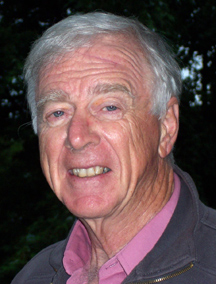Robert K. Brayton: Difference between revisions
No edit summary |
m (Text replace - "[[Category:Computers and information processing" to "[[Category:Computing and electronics") |
||
| Line 19: | Line 19: | ||
[[First-Hand:Solid State Circuits Society First Hand Histories|Solid State Circuits Society First Hand Histories]] | [[First-Hand:Solid State Circuits Society First Hand Histories|Solid State Circuits Society First Hand Histories]] | ||
[[Category:Design automation|Brayton]] [[Category: | [[Category:Design automation|Brayton]] [[Category:Computing and electronics|Brayton]] | ||
Revision as of 16:00, 22 July 2014
Biography
A professor in the Department of Electrical Engineering and Computer Sciences at the University of California at Berkeley, Dr. Robert K. Brayton is internationally recognized as one of the world’s preeminent authorities and a pioneer in logic synthesis and formal verification.
His seminal contributions to logic synthesis have been critical in the design of application-specific integrated circuits and the development of CAD products that use logic synthesis tools. Dr. Brayton’s work resulted in design automation methods that enable the rapid circuit design for diverse applications in the consumer, defense and health-care fields. In addition to practical design tools, his work in logic synthesis led to such practical implementations as the retiming and optimization of circuits for high speed. His activities have helped cut the cost of semiconductor chip design while allowing for better performance and electrical characteristics than those designed manually.
Dr. Brayton led the development of the Multi-level Logic Synthesis System, MIS, which is a program developed at Berkeley and used by industry leaders like Intel and DEC. The MIS program and its successor, SIS, VIS, MVSIS, and ABC, are used worldwide for education and for the design and verification of complex logic systems, influencing almost all commercially successful EDA systems and many internal developments at major semiconductor manufacturers.
Earlier in his career, as a researcher at the IBM Thomas J. Watson Research Center in Yorktown Heights, New York, he led the Yorktown Silicon Compiler team working on the most advanced logic synthesis system at the time. He is also recognized for his co-development of the sparse tableau methodology. It is the foundation for many of the main ideas in circuit simulation today, including the ASTAP-II circuit simulation program at IBM which he helped develop.
An IEEE Fellow and member of the National Academy of Engineering, Dr. Brayton has received the IEEE Circuits and Systems Technical Achievement Award, the Circuits and Systems Golden Jubilee Award, and the IEEE Third Millennium Medal. He received the 2006 European Design Automation Society lifetime achievement award presented at the Design, Automation and Test in Europe Conference and Exhibition in Munich.
He holds a bachelor's degree in electrical engineering from Iowa State University in Ames, Iowa, and a doctoral degree in mathematics from the Massachusetts Institute of Technology in Cambridge.
